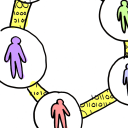The payments system is a vital public service – why don’t we run it like one?

Image: Sean MacEntee, CC BY 2.0
We know what banks do, don’t we? They manage people’s savings, help them to buy houses, and provide finance for businesses. The old 3-6-3 model of banking says it all: “borrow at 3 percent, lend at 6 percent, be on the golf course by 3 pm”. If we could only strip away all the froth and bubble created by investment banks, we could restore banking as it used to be: a bank in every town and village, each headed by a responsible bank manager trusted to make his own lending decisions. People’s savings would be safe, businesses would be able to obtain finance, and house price bubbles driven by excessively risky mortgage lending would become a thing of the past. And above all, there would no longer be any risk of a financial crisis on the scale of 2008.
Since the financial crisis, ideas for bank reform have been dominated by the idea that this “golden age of retail banking” can be restored. People campaign for the return of 1930s legislation separating retail and investment banking, the breakup of too-big-to-fail banks, and the creation of a network of small banks with a mandate to focus on business lending. Some go further, calling for the introduction of what is variously known as “full reserve banking”, “narrow banking” and “sovereign money”.
But in the last half-century or so, banking has fundamentally changed. Taking in static savings and investing them to deliver a return to savers is no longer a primary function for banks: that has become the job of asset managers. And lending to households and businesses, while still important, has been eclipsed by a third function that banks have acquired in the last half-century – a function so crucial that if it fails, even for a few hours, the entire economy suffers a heart attack. I refer, of course, to payments.
Back in the 1950s – that “golden age” of retail banking – ordinary people didn’t use banks much. Blue-collar workers were paid in cash on a Friday night (the famous “pay packet”). They spent some of it in the pub and gave the rest to their wives, who paid the rent and bills, bought food and gave the children their pocket money, all of it in cash. Neither the men nor their wives had bank accounts from which they could make payments, though they might have building society savings accounts. In fact, as late as the 1970s, most women didn’t have bank accounts of any kind.
Lending, too, was very different then. Mortgages were hard to get, often taking six months or more to approve: only about 30% of adults owned their own home. If you needed money for an exceptional purchase, you had to save for it, or – from 1954 onwards – obtain your goods on hire purchase. British banks didn’t provide unsecured loans to ordinary people until 1958. Credit cards didn’t appear until the mid-1960s.
In fact, during this “golden age” of retail banking, the economy ran mainly on cash – and even that wasn’t easy to obtain. Cash could only be obtained over the counter in a bank branch, and bank branches closed at 3 or 3.30 pm. If you didn’t get your cash out by closing time on Friday, you had to do without until Monday morning. You could write a cheque, but before cheque guarantee cards were introduced in 1969, many retailers would not accept cheques.
Banks handled payments for larger businesses and richer households. But the millions of transactions between ordinary people and smaller businesses that are the lifeblood of any economy – those were in cash.
But these days, most of those transactions are no longer in cash. They are electronic payments. Wages are no longer paid in cash, but directly into bank accounts. Pensioners no longer have to queue at the Post Office for their pensions: pensions are paid directly into their bank accounts. People no longer pay household bills in cash, but directly from bank accounts with direct debits, online and telephone banking, and debit and credit cards. People buy goods and services using cards and – increasingly – mobile phones: for small transactions, contactless technology makes using cards and phones even easier than cash. Payment can even be made by text message. And the system is fast, too. The UK’s Faster Payments clearing system transfers money from one bank account to another within two hours.
Of course, some people prefer to use cash. But they no longer have to queue up to get their weekend money by 3 pm. With today’s extensive network of ATMs, they can obtain cash at any hour of the day or night. For those still using cheques, new digital technology promises to speed up cheque clearing so that money reaches the recipient within hours instead of days.
Payments have never been so easy or so fast, and cash has never been used so little. But as a result, our dependence on large banks has never been so great. We expect a 24/7, failsafe payments service. If a bank’s payments technology fails, even for an hour or two, its customers can’t pay bills or buy food, wages don’t arrive on time, business-to-business payments fail. Because the system never stops, IT glitches like this are difficult to fix: it can take weeks or months to ensure that payments have reached the right people and account balances are correct.
We’ve heard a lot about how interconnectedness between banks increases the riskiness of the financial system. But banks must be interconnected for our fast, efficient payments network to work. The problem is that if a large bank fails, the entire payments network can seize up, doing untold damage to the economy. This doesn’t just affect electronic payments: even cash can fail, because if ATMs stop working, no-one can obtain cash out of banking hours.
Moving money to a small bank or a credit union, as some have advocated, does not reduce dependence on larger banks. Larger banks clear payments for small ones – for example, Barclays might clear payments for London Credit Union. All moving money does is reduce large banks’ stable funding, which makes it more likely that they will have difficulty finding the money to clear the payments on which we all rely. Without radical reform of the payments network, breaking up the large banks or encouraging people to move to small banks is unwise.
The truth is that we have allowed a crucial public service to become deeply embedded in a system which is by nature risky. The folly of this beggars belief.
Proposals for full reserve banking at least recognise the problem. The payments network cannot be allowed to fail, so let’s prevent banks from taking risks. But risky lending is the business of banks: their job is to provide finance to people and businesses that need money, and that means accepting the risk that some people and businesses will fail to repay. It is inevitable that some banks will manage their risks disastrously badly. They need to be allowed to fail – but if the payments network cannot cope with bank failure, they can never be allowed to fail. This is the “too-big-to-fail” corner that we have boxed ourselves into.
To be sure, we now have a payments system regulator dedicated to ensuring that the system always meets the needs of customers. This is its mandate, according to its website:
- to ensure that payment systems are operated and developed in a way that considers and promotes the interests of all the businesses and consumers that use them
- to promote effective competition in the markets for payment systems and services – between operators, PSPs and infrastructure providers
- to promote the development of and innovation in payment systems, in particular the infrastructure used to operate those systems
There is nothing there about protecting the payments system and its customers from major bank failure. And as this regulator is an arm of the FCA not the PRA, there is no direct connection between regulating the payments system and regulating the banks that are its principal gateway. The payments system regulator may keep the payments systems themselves going, but it cannot address the inherent fragility of a payments system that uses risk-taking banks as gateways.
So how can the payments network be protected from the risky but essential activities of commercial banks? Perhaps commercial banks should be required to ring-fence current accounts and back them with cash and liquid assets. The ring-fencing that will come into force in the UK in 2019 is not fit for purpose, since included within the ring fence are various forms of highly risky lending, such as mortgages. With deposit insurance for static savings, and higher capital requirements for banks, ordinary savers do not need this ring fence. But current account holders can’t wait for deposit insurance to pay out, and locking people out of current accounts because a bank is experiencing IT glitches or temporary liquidity problems is socially and economically destructive. Ring-fencing current accounts and backing them with cash would protect ordinary people and businesses while still allowing banks to do risk lending.
A more radical solution would be a public utility for payments. Currently, all electronic payments are finally settled through the central bank’s real-time gross settlement (RTGS) system (in the UK this is the CHAPS system, in the EU it is Target2, in the US it is Fedwire). Commercial banks control the gateways to this system, because they hold the transaction accounts that are the start point and destination of all payments. But suppose the central bank – which cannot fail – provided transaction accounts for people and businesses, and a digital currency as a primary means of exchange? The gateways would need to be redirected, of course, though this is not an insoluble problem. Perhaps more difficult to solve might be the need for unsecured overdraft facilities (currently, central banks only provide overdrafts if securities are pledged as collateral). And the implications for monetary policy would need to be considered.
There may be other solutions, too. But until we recognise the payments system for the crucial public service that it is, people will continue to propose banking reforms that could do more harm than good.






